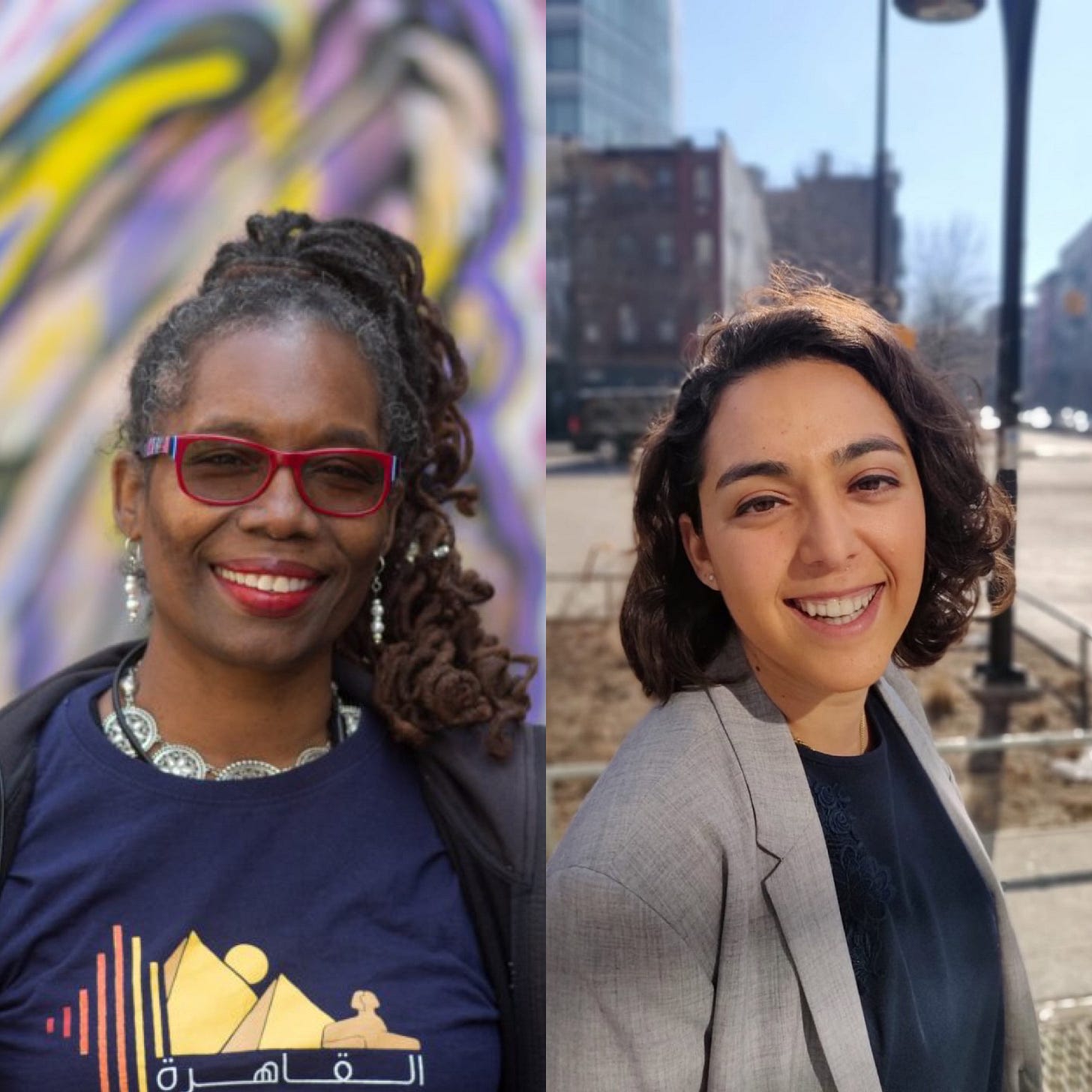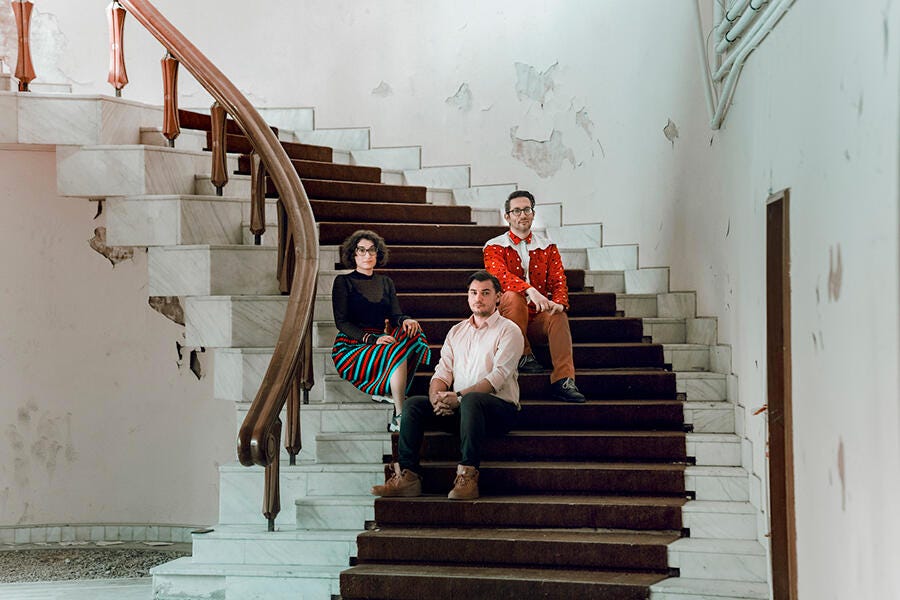Global Roundup: Feminist Podcasts in Egypt, Free Binders in New Brunswick, Protesting Anti-Trans Injustice in the UK, Romanian LGBTQ+ Museum, First Woman Vice-Chancellor at Indian University
Curated by FG Contributor Inaara Merani
Kim Fox and Yasmeen Ebada. Photos via Fair Planet.
In recent years, podcasts have grown widely popular in Egypt. Many women have begun using their podcast platform as a means to challenge the patriarchy. Kim Fox and Yasmeen Ebada, researchers at the American University in Cairo, recently conducted a study to better understand how Egyptian feminists are spreading their stories through podcasts.
The study found that women podcasters in Egypt have been engaging in feminist ways of learning and teaching, and have embodied diverse feminist perspectives. The topics discussed by these feminist podcasters include Black, western, and post-colonial feminist views on women’s rights issues in Egypt.
Initially, cyber activism came in the form of blogs, and then social media picked up on it as well. I would put that at the forefront of cyber activity in Egypt. In terms of podcasts, it‘s still too young and gaining its presence and its footing in Egypt to be something that‘s more dominant than those other platforms. – Kim Fox, researcher
Social media and podcasts have become a large source of information in today’s world. Women podcasters in Egypt have capitalized on this market to advocate for women’s rights and discuss issues that are usually viewed as taboo within Egyptian society. Although it is still a growing market, there is potential for the future of feminist activism in Egypt.
I remember the first time I ever heard these podcasts when we were working on the study. And I remember listening to them and my first reaction was being furious, being in rage, but also feeling really powerful. Feeling like I want to get up and talk about it more. That was my instinct. - Yasmine Ebada
Although podcasting in Egypt is a growing market, it is a market which has the ability to uniquely share stories of feminist resistance to the patriarchy. The way in which women tell their stories on podcasts and engage in feminist cyber-activism is powerful; podcasts give individuals the opportunity to tell their stories in a way that resonates with many others.
But when I think about activism and cyber activism, the way they tell their stories is really settled. It‘s more inspiring. So even when I play these podcasts for my current students, the women react immediately. Like: 'I see myself in that story.' Like: 'She is me.' And Yasmeen knows it too: We see ourselves in their struggle.”– Kim Fox
Two LGBTQ+ organizations in New Brunswick, Canada, are providing free chest binders to queer and trans people in the area. Chtoma N.B. is a queer non-profit in Saint John, New Brunswick, whereas QT Fatties is a local grassroots collective comprised of and representing fat queer people. Together, these organizations are creating a more positive and inviting environment for queer and trans people in eastern Canada.
There’s a huge link between mental health in our trans and non-binary populations and their appearance; how other folks are perceiving them…For transmasculine people, non-binary people or anyone who prefers that look of a flatter chest, binders can reduce gender dysphoria and increase their confidence. – Tanya James, Chroma’s operations manager
In order to receive a binder, individuals must fill out a brief form with shipping and sizing information. Although located in Saint John, Chroma N.B. ships all over New Brunswick. However, many queer people have spoken about the risk of being outed when items are delivered via mail; therefore, Chroma N.B. offers pickup options for anyone wishing to pick up their binders in person.
Before this program began, many queer people would reach out to Chroma in search of chest binders. The organization initially wanted to create a physical binder library in Saint John, allowing people to try on the binders in person before ordering online. During the organization’s search to source binders, they came across gc2b, a trans-owned company in the US that partners with non-profits to give out free binders to individuals needing them. Last summer, Chroma began a partnership with gc2b, which eventually transitioned into the free binder program that exists today.
Lack of access to proper binding materials and products can result in unsafe binding practices, which can restrict breathing and cause back pain and/or fluid buildup in the lungs. Access to safe binders is difficult for many queer and trans people, due to the cost and physical availability.
It’s been really cool to see who is requesting them. We’ve had parents reach out for their children, and high school students…It just shows that it’s more of a need than we thought it was. – Tanya James
LGBTQ+ protesters gathered outside Downing Street on Tuesday, 17 January, to rally against the UK government’s decision to block the Scottish Gender Recognition Reform Bill. Photo via PinkNews.
On Monday, the UK government announced that it would block the Scottish Gender Recognition Reform Bill. Also known as the Scottish reforms, this bill would have made it easier for trans people to have their gender legally recognized. The bill to amend the Gender Recognition Act (GRA) was initially passed in December, however, the UK government chose to strike it down before passing.
Yesterday, a small group of protesters gathered outside of Downing Street to voice their opinions about this decision. Many protesters spoke out against the striking down of the bill, criticizing the government for the lack of support for queer and trans people.
This government has proven time and time again that it is committed to opposing trans rights improvements. It’s a major political campaigning point for the Tory government. – Laura Dale, protester
The Gender Recognition Bill, if passed, would have streamlined the process in Scotland for legally changing one’s gender. The proposed bill would have the legal age to apply for a gender recognition certificate lowered from 18 to 16. It also would decrease the amount of time applicants need to have lived as their affirmed gender, from two years to six months, if they are 16 or 17 years old.
The first minister of Scotland, Nicola Sturgeon, has also publicly criticized the UK government’s decision to block this bill, labelling it a full-frontal attack on democracy in the UK. Sturgeon, among other advocates in the UK, strongly condemn this move and have vowed to continue fighting for queer and trans rights.
Trium Amiria curators: Ioana Gonțea, Vlad Viski and Dragoș Olea (from left to right). Courtesy: Trium Amiria; Photograph: Mihai Neagu.jpg. Photo via Frieze.
Triumf Amiria was just inaugurated as the first museum of queer culture in Romania. The collective was initially launched as a manifesto, before transitioning into a physical exhibition space which features ongoing series of artistic programmes that explore queer topics.
The practice researches, disseminates, and highlights queer culture and queer artistic production in Romania, such as literature, visual arts, theatre and performance, sound, and more.
TRIUMF AMIRIA – Muzeul Culturii Queer [?] is an ever-changing expression of a complex process of queering ~ critical thinking about what a museum could be, therefore it reveals itself as a hybrid between a real institution possible in the confines of the Romanian context and an ideal construct.”– Triumf Amiria Collective
The project was curated by artists Ioana Gonțea, Dragoș Olea and Vlad Viski. Triumf Amiria launched two years ago, to commemorate the 20th anniversary of the decriminalization of homosexuality in Romania. During the 1960s, the former Romanian president created a law which criminalized all same-sex relationships. Despite the fall of Communism in the 1990s, the article still remained intact until 2001 when it was officially decriminalized.
Triumf Amiria strives to create a renewed engagement with Romania’s queer histories. With 245 pieces of art, created by 38 artists and collectives, this museum has been able to showcase the diversity of the queer experience, highlighting the irrefutable presence of queer life in Romania.
Professor Renu Vig, vice chancellor of Panjab University. (Express Photo). Photo via Indian Express.
Renu Vig has just become the first woman Vice-Chancellor at Panjab University. After Raj Kumar was forced to resign as Vice Chancellor over the weekend due to allegations of corruption, Vig stepped into the position, making this a historic first at the university.
Vig was the first woman teaching assistant at the Punjab Engineering College in 1985 after graduating in electronics and communication. She is also hailed as one of the first women in the Punjab region to continue studying and teaching while she pursued her engineering degree. Vig has said she was always drawn to teaching.
My mother was a teacher and she often told me how much I loved to teach, and how I would hold an imaginary class even as a very young girl. – Renu Vig
Although Vig had connections to Punjab Engineering College through her husband and father-in-law, she still recalls great difficulty as a woman in STEM in the 1980s. In a class of 30 students, there were only five women. Vig eventually decided to pursue her PhD in Artificial Intelligence at Panjab University, the institution which she now leads.
Despite the backlash she endured in school, Vig was always supported by the men in her life who wanted her to pursue an education. Her father-in-law encouraged her to pursue her PhD abroad, but Vig chose to remain close to home. In this new position, Vig has vowed to make Panjab University the top institution in the region.
Inaara Merani (she/her) recently completed her Masters degree at the University of Western Ontario, studying Gender, Sexuality, and Women’s Studies with a specialization in Transitional Justice. In the upcoming years, she hopes to attend law school, focusing her career in human rights law.
Inaara is deeply passionate about dismantling patriarchal institutions to ensure women and other marginalized populations have safe and equal access to their rights. She believes in the power of knowledge and learning from others, and hopes to continue to learn from others throughout her career.








